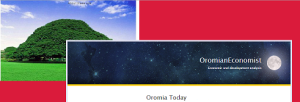CALAIS, France, Oct 24 (Thomson Reuters Foundation) – Deep in the Calais “Jungle” migrant camp in northern France, hundreds of Oromo Ethiopians set up their own school.
An Irish volunteer came to teach classes during the day, but at other times groups of Oromo men, and a few women, gathered to discuss the news from Ethiopia: this month’s announcement of a state of emergency, or the rising death toll in protests.
On the sides of makeshift wooden shelters they painted the crossed arms protest symbol of the Oromo struggle, publicised by Ethiopian marathon runner Feyisa Lilesa at the summer Olympics.
“Feyisa never give up,” was written on one wall, and “Stop killing Oromo students” was scrawled on another.
People from Oromiya, a region at the heart of Ethiopia’s industrialisation efforts, accuse the state of seizing their land and offering tiny compensation, before selling it on to companies, often foreign investors, at inflated prices.
“When we went to demonstrations they killed many people, they arrested many people, they put in jail many people. So we had to escape from the country,” said Solan, a 26-year-old from Addis Ababa.
The former science student left Ethiopia in 2014 after his family was forcibly evicted from the land they had lived on for generations, he told the Thomson Reuters Foundation.
Now Solan and hundreds of his fellow Oromo in the Jungle face eviction once again.
On Monday, French authorities began clearing the sprawling, ramshackle camp outside the port town of Calais, in preparation for the demolition of the shanty-town that has become a symbol of Europe’s struggle to respond to an influx of migrants fleeing war and poverty.
Hundreds of migrants carrying suitcases lined up outside a hangar to be resettled in reception centres across France.
But most migrants in the camp have made their way to Calais because they want to reach Britain, and make regular attempts to sneak aboard trucks or trains bound for the UK.
Groups like the Oromo say they have a particular reason for doing so. They are worried France won’t grant them asylum because it doesn’t recognise them as persecuted, based on the experience of others who have been rejected.
ASYLUM
The U.N. refugee agency UNHCR said everyone in the Calais camp would be offered the chance to be transferred to a reception centre where they could apply for asylum.
“There will be no blanket decisions for certain nationalities,” spokeswoman Laura Padoan said.
French asylum chief Pascal Brice recently visited the Jungle and offered reassurances to the migrants and refugees, including the Oromo group, said Solan.
Brice was not available for comment when the Thomson Reuters Foundation contacted his office on Monday.
“If they accept us we want to stay here (in France),” said Solan, who did not want to give his full name. “We are not searching for a better country, we are here (in Calais) because England accepts Oromo people.”
The latest unrest broke out last year in Oromiya, as people took to the streets accusing the state of seizing their land and handing it over to investors with minimal compensation.
Unrest spread to other areas, including parts of Amhara region north of the capital, over land rights and wider complaints over political freedoms.
Ethiopian authorities said on Thursday they had detained 1,645 people since declaring the state of emergency in a bid to quell mass protests and violence.
Rights groups report more than 500 have been killed in protests in Oromiya since last year, but the government denies using excessive force and says the death toll is exaggerated.
Solan has been moving back and forth between Calais and a makeshift migrant camp in Paris for the past year, he said. In that time many other Oromo have come and gone from Calais – some as young as 12 or as old as 65. Many lose hope of reaching Britain and instead go to the Netherlands or Germany, he said.
“I am asking for everybody to stay with us, to support us, to save our children, to save our home, to save our story, to save our land,” he said.
(Editing by Ros Russell; Please credit the Thomson Reuters Foundation, the charitable arm of Thomson Reuters, that covers humanitarian news, women’s rights, trafficking, corruption and climate change. Visit http://www.trust.org)
Related:-#OromoRevolution Oromo refugees protest against the regime that forced them into this life as they are being evicted from Calais refugee camp in France
Down
Down
Weyane








You must be logged in to post a comment.